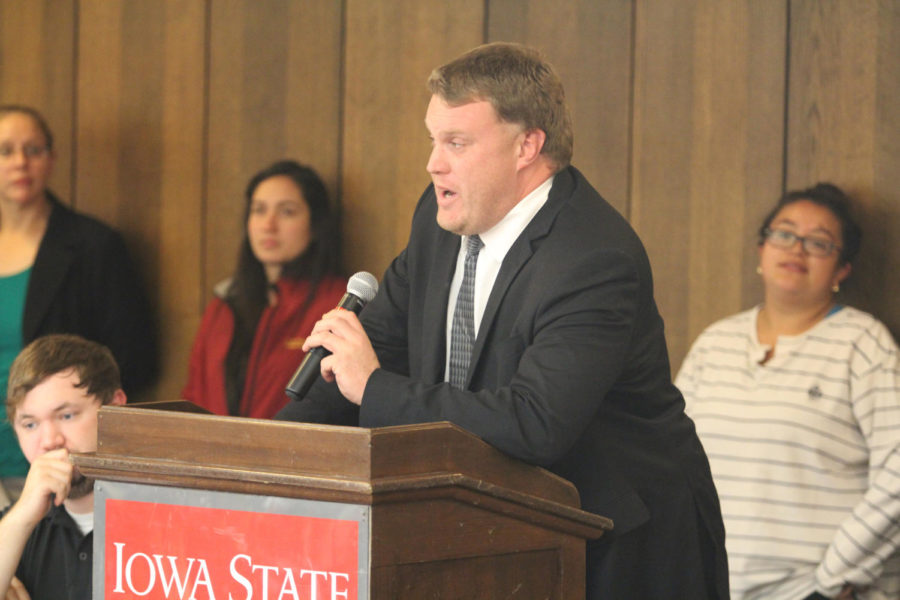- App Content
- App Content / News
- News
- News / Politics And Administration
- News / Politics And Administration / Campus
Iowa State settles Dunn lawsuit, changes policies
Senator Robert Dunn, senior in accounting, asks senators and audience members to remain respectful and vocalizes his disapproval of the later discussion over the Diversity Training during a Student Government meeting Oct. 14, 2015.
April 3, 2017
Iowa State will change its policies on discrimination and harassment after settling a lawsuit filed by Robert Dunn, senior in accounting, according to The Gazette.
The complaint, filed in the Southern District of Iowa Courts on Oct. 17, asked for declaratory and injunctive relief stating that the university violated the First and 14th amendments. Iowa State’s policies will now state that it “won’t penalize students who fail to pledge compliance,” The Gazette reported.
The university agreed to cover Dunn’s legal fees, which amount to $12,000, after signing a settlement last month.
After Dunn filed the lawsuit five months ago, Iowa State reviewed the policies in question ultimately revising them in December 2016.
Dunn expressed that clearer policies for something like harassment were his goal from the start stating that he found the original policies to be “vague.” He feels that this outcome will be beneficial to both the administration and Iowa State students.
“Once we graduate, you can’t get arrested for saying that the definition of marriage should be between one man and one woman,” Dunn said.
As a member of “ISU Young Americans for Freedom,” Dunn was involved in organizing events that Reginald Stewart, senior vice president for diversity and inclusion, told Dunn were offensive to other students and could be punished under university policies.
Dunn faced a hold on his graduation and was placed on a list of students to be reviewed by Interim Dean of Students Keith Robinder, according to the complaint.
John McCarroll, executive director of university relations, stated in an email that Dunn was neither disciplined nor threatened with disciplinary action for his speech or policies in question.
He also wrote that “Iowa State is committed to freedom of expression and our policies comply with the U.S. Constitution and state and federal laws. We take seriously our responsibility to prevent and address illegal discrimination and sexual harassment and sexual misconduct.”
The complaint argues that public universities serve as a marketplace of ideas “where the young adults who are tomorrow’s leaders are exposed to differing opinions.”
Dunn served the complaint against Iowa State President Steven Leath, Senior Vice President for Student Affairs Martino Harmon, Director of the Office of Equal Opportunity Margo Foreman, Assistant Dean and Director of the Office of Student Conduct Sara Kellogg, members of the Student Conduct Hearing Board, Robinder and Stewart.
Two instances led Dunn to file the suit: the requirement by law to take part in Title IX training and Iowa State faculty and staff telling him his conservative view points violate university policies.
“A student could reasonably conclude from this online mandatory training problem that any discussion of gender identity could be sexual harassment under ISU policies if any listener — even if not the intended listener — took offense, without any consideration of the First Amendment rights of other students,” the complaint reads.
Casey Mattox, Alliance Defending Freedom senior counsel, said in a press release that no university policy can trump the First Amendment and that “Iowa State thinks it knows better than the First Amendment, making other student’s opinions about the value of a student’s speech, instead of the Constitution, the test for whether speech is protected.
The settlement does not prevent Iowa State from requiring students to take online courses like the Title IX course. Rather, the university will change its policy to avoid penalizing students who fail to pledge compliance to its discrimination and harassment policies.
Under the revised policies students will still be required to certify their understanding of the policies during the training process.
















